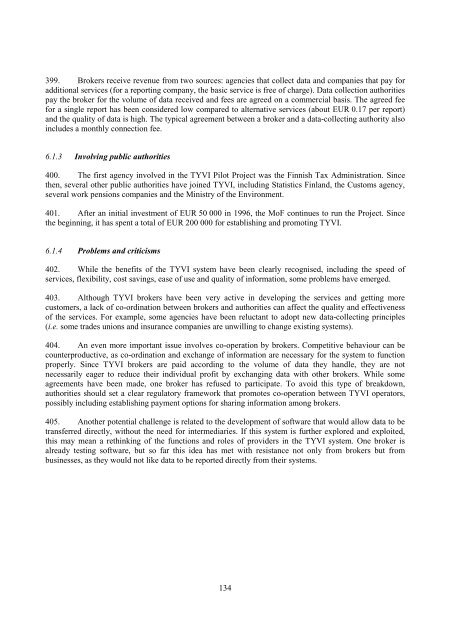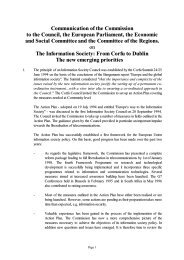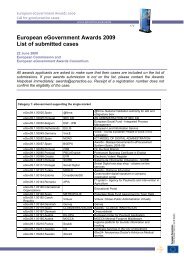e-GOVERNMENT IN FINLAND - ePractice.eu
e-GOVERNMENT IN FINLAND - ePractice.eu
e-GOVERNMENT IN FINLAND - ePractice.eu
Create successful ePaper yourself
Turn your PDF publications into a flip-book with our unique Google optimized e-Paper software.
399. Brokers receive revenue from two sources: agencies that collect data and companies that pay for<br />
additional services (for a reporting company, the basic service is free of charge). Data collection authorities<br />
pay the broker for the volume of data received and fees are agreed on a commercial basis. The agreed fee<br />
for a single report has been considered low compared to alternative services (about EUR 0.17 per report)<br />
and the quality of data is high. The typical agreement between a broker and a data-collecting authority also<br />
includes a monthly connection fee.<br />
6.1.3 Involving public authorities<br />
400. The first agency involved in the TYVI Pilot Project was the Finnish Tax Administration. Since<br />
then, several other public authorities have joined TYVI, including Statistics Finland, the Customs agency,<br />
several work pensions companies and the Ministry of the Environment.<br />
401. After an initial investment of EUR 50 000 in 1996, the MoF continues to run the Project. Since<br />
the beginning, it has spent a total of EUR 200 000 for establishing and promoting TYVI.<br />
6.1.4 Problems and criticisms<br />
402. While the benefits of the TYVI system have been clearly recognised, including the speed of<br />
services, flexibility, cost savings, ease of use and quality of information, some problems have emerged.<br />
403. Although TYVI brokers have been very active in developing the services and getting more<br />
customers, a lack of co-ordination between brokers and authorities can affect the quality and effectiveness<br />
of the services. For example, some agencies have been reluctant to adopt new data-collecting principles<br />
(i.e. some trades unions and insurance companies are unwilling to change existing systems).<br />
404. An even more important issue involves co-operation by brokers. Competitive behaviour can be<br />
counterproductive, as co-ordination and exchange of information are necessary for the system to function<br />
properly. Since TYVI brokers are paid according to the volume of data they handle, they are not<br />
necessarily eager to reduce their individual profit by exchanging data with other brokers. While some<br />
agreements have been made, one broker has refused to participate. To avoid this type of breakdown,<br />
authorities should set a clear regulatory framework that promotes co-operation between TYVI operators,<br />
possibly including establishing payment options for sharing information among brokers.<br />
405. Another potential challenge is related to the development of software that would allow data to be<br />
transferred directly, without the need for intermediaries. If this system is further explored and exploited,<br />
this may mean a rethinking of the functions and roles of providers in the TYVI system. One broker is<br />
already testing software, but so far this idea has met with resistance not only from brokers but from<br />
businesses, as they would not like data to be reported directly from their systems.<br />
134
















